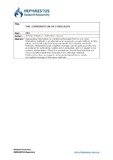| dc.contributor.author | Winkler, Robert L. | |
| dc.contributor.author | Makridakis, Spyros | |
| dc.date.accessioned | 2015-12-07T16:40:21Z | |
| dc.date.available | 2015-12-07T16:40:21Z | |
| dc.date.issued | 1983 | |
| dc.identifier.uri | http://hdl.handle.net/11728/6356 | |
| dc.description.abstract | Aggregating information by combining forecasts from two or more forecasting methods is an alternative to using just a single method. In this paper we provide extensive empirical results showing that combined forecasts obtained through weighted averages can be quite accurate. Five procedures for estimating weights are investigated, and two appear to be superior to the others. These two procedures provide forecasts that are more accurate overall than forecasts from individual methods. Furthermore, they are superior to forecasts found from a simple unweighted average of the same methods. | en_UK |
| dc.language.iso | en | en_UK |
| dc.publisher | Wiley | en_UK |
| dc.relation.ispartofseries | Journal of the Royal Statistical Society;vol. 146 | |
| dc.rights | © 1983 Royal Statistical Society | en_UK |
| dc.rights.uri | http://creativecommons.org/licenses/by-nc-nd/4.0/ | en_UK |
| dc.subject | Forecasting | en_UK |
| dc.subject | Combined Forecasts | en_UK |
| dc.subject | Weighted averages | en_UK |
| dc.subject | Estimation of weights | en_UK |
| dc.subject | Accuracy of forecasts | en_UK |
| dc.title | The Combination of Forecasts | en_UK |
| dc.type | Article | en_UK |
| dc.doi | 10.2307/2982011 | |


